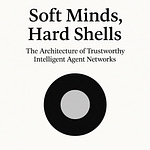Introduction
Artificial Intelligence has traditionally been synonymous with giant models—massive neural networks that can discuss anything from culinary techniques to quantum physics. But as organizations demand more reliable, domain-specific AI, the focus is shifting from generalist behemoths to smaller, expert “agents.” These specialized agents, each distilled from a large source model and then carefully credentialed, fit seamlessly into the Internet Trust Layer (ITL). When integrated with the ITL’s verifiable credentials, finite state machines, and micro-ledgers, these AI agents effectively become “graduates” certified in specific fields—a concept we might call “Agents with Diplomas.”
Below, we explore how the ITL approach nurtures an emerging ecosystem of specialized AI agents. By anchoring each agent in secure hardware, verifying its domain expertise through cryptographic proofs, and guiding their interactions via deterministic logic, the ITL redefines digital trust for AI-based workflows.
The Rise of Specialized AI Agents
From One Big Model to Many Small Specialists
Large foundation models are undeniably impressive: they generate text, translate languages, and even compose music. Yet, they often lack finely tuned expertise, let alone certification, for mission-critical tasks—banking compliance, medical image analysis, industrial diagnostics, or legal drafting. Organizations that rely on stringent standards and explicit accountability do not merely need a model that “sounds convincing.” They need AI outputs backed by certification, evidence and traceability.
Hence, the concept of “distilled” AI specialists has gained ground. Rather than run an entire giant model for every single request, organizations extract and refine for their own local use smaller sub-models (or “agents”) that excel at well-defined tasks. Such specialization reduces computational overhead, clarifies scope, and—importantly—allows more rigorous testing. In short, a single “general manager” AI can spawn multiple “specialist graduates,” each with a specific diploma.
Why This Matters
1. Predictability: A specialized agent optimized for analyzing, say, loan applications is less likely to wander off-topic or produce irrelevant errors.
2. Compliance: In heavily regulated fields (financial services, healthcare, energy), specialized AI ensures the processes and data remain within known boundaries.
3. Efficiency: Smaller, domain-focused models use fewer resources and often respond faster, which makes them highly suitable for real-time or large-scale deployments.
Yet the real breakthrough arrives when these specialized agents can be formally recognized—an AI agent proving its domain expertise the same way a professional shows a diploma or license.
The ITL: A New Fabric of Trust
The Internet Trust Layer (ITL) framework embodies a decentralized approach to digital interactions, weaving together Agents, Verifiable Credentials, and Micro-Ledgers. In the ITL context:
• Person Agents represent individuals or organizations.
• Context Agents manage specific workflows (e.g., a trade contract, a loan application process).
• System Agents provide administrative or infrastructural tasks such as creating new agents, managing credential schemas, or registering services in a directory.
By removing reliance on large centralized authorities and avoiding monolithic global ledgers, the ITL fosters a zero-governance environment where no single entity reigns over the entire network. Instead, trust arises from cryptographic proofs, deterministic rules, and localized micro-ledgers.
Specialized AI as a New Kind of Person Agent
Although the term “Person Agent” might imply a human, it can equally represent an AI entity that has been granted credentials for a specific domain. That AI agent is then anchored to hardware-bound cryptographic keys—ensuring that nobody can impersonate or tamper with its identity. Whenever this AI agent presents a recommendation, a classification, or a decision, it can attach cryptographic proofs of:
• Domain Certification: The agent has a valid “diploma”—in other words, a verifiable credential stating it was thoroughly tested for a particular task.
• Data Integrity: The input data or knowledge base has not been altered during or after its specialized training process.
• Evidence of Past Performance: Previous transactions or tasks it performed, logged in the agent’s micro-ledger, showing a consistent record of accuracy or compliance.
Certifying the AI Agent’s “Diploma”
In this trust-based network, the AI “diploma” is not an arbitrary badge but an actual verifiable credential (VC). A specialized Context Agent—think of it as an accreditation body—reviews the AI model’s performance, tracks relevant tests, and issues a “Domain Specialist” VC upon successful completion. Because the credential is signed and anchored via the ITL, anyone can verify:
1. Which authority issued it
2. When it was issued, and for which scope
3. Whether it remains valid or has been revoked
Furthermore, selective disclosure enables the AI agent to prove its qualification in “financial compliance,” for example, without exposing other details about its training.
Core Principles for “AI Agents with Diplomas”
1. Deterministic
Within the ITL, specialized AI agents operate under deterministic contract logic. A specialized AI that analyzes financial transactions, for instance, cannot push a transaction forward unless the relevant verifiable credentials are in place. A Context Agent—perhaps a loan-approval workflow—checks the AI’s “financial compliance diploma.” If valid, the AI’s recommendation becomes part of the official record. If the credential is expired or unrecognized, the workflow does not proceed, ensuring no hidden overrides.
2. Evidential
Every claim made by an AI agent must be supported by proof. If the agent recommends a contract decision or flags a suspicious transaction, it must present cryptographically verifiable evidence. This might be a signed log snippet (“Based on risk score = 8.7 from recognized data sources”), plus the agent’s own credentials. Verifiability replaces reputation-based trust—nobody can simply declare, “We are experts!” without cryptographic backing.
3. Contextual
An AI agent with a “diploma” in advanced shipping analytics might be recognized only for shipping-related tasks. It should not automatically be trusted for handling medical data or legal opinions. The ITL’s emphasis on Context Agents ensures that each environment imposes domain-appropriate credential checks.
4. Granular
In specialized AI, a “diploma” can be even more fine-grained. An image-analysis agent might handle CT scans but not PET scans or X-rays. Credentials stay narrow and precise, minimizing risk. If a credential or key is compromised, the damage is contained to the specific domain (e.g., CT-scan approvals) instead of leaking across the entire enterprise.
5. Temporal
AI credentials may expire or require periodic renewal—crucial for fields where knowledge updates rapidly (medicine, finance, cybersecurity). The ITL enforces expiration dates; a new version of the credential is issued only if the agent continues to perform accurately under current standards.
6. Resilient
If one specialized AI agent goes offline or is compromised, other similarly credentialed agents can continue operating. Each agent logs transactions in its own micro-ledger, preventing any single meltdown. Cross-verification can flag tampered logs. Even in partial network outages, the ITL’s local autonomy keeps tasks running until synchronization is restored.
From Creation to Graduation: How an AI Earns Its Credential
1. Distillation
• A large model is carefully reduced into a smaller sub-model focused on a clear domain (e.g., automated mortgage approvals).
• This sub-model is tested extensively—accuracy checks, reliability under data drift, stress-tests against adversarial samples.
2. ITL Bootstrapping
• A specialized Person Agent Creation Agent (PACA) spawns a new AI Person Agent, anchoring it to hardware-secured private keys.
• The AI Person Agent receives its own micro-ledger, effectively creating a unique, tamper-evident record of future activities.
3. Accreditation
• A recognized Context Agent (perhaps run by a regulatory body or industry consortium) issues a verifiable credential upon successful evaluation—this is the AI’s “Diploma.”
• The credential, digitally signed and published in the issuer’s micro-ledger, confirms the domain, version, and validity period.
4. Deployment and Collaboration
• When the AI is invoked for a new task—say, assessing a large set of trade documents—it must present its credential to the relevant Context Agent that orchestrates the workflow.
• The Context Agent verifies authenticity and decides whether to trust the AI’s recommendations, logging each interaction in a local micro-ledger.
5. Ongoing Updates
• As the AI refines its knowledge or meets renewed performance metrics, it can request updated credentials. Each time, the re-accreditation process is cryptographically logged.
• If the agent is compromised or performs poorly, the credential can be revoked, instantly invalidating the AI’s authority in that domain.
Real-World Scenarios
Financial Compliance
• Use Case: A specialized anti-money-laundering (AML) AI agent.
• Diploma: “Regulated AML Specialist (ver. 2.1)” issued by an industry or government-accredited body.
• Operation: When a Context Agent processes a new cross-border transaction, it queries the AML agent’s analysis. The AML agent presents its domain credential and provides an evidential report. Only if it has an active diploma does the final workflow proceed.
Healthcare Diagnostics
• Use Case: An AI agent specialized in detecting early signs of diabetic retinopathy.
• Diploma: “Retinal Image Analysis, Certified Accuracy ≥ 95%” from a medical certification board.
• Process: A patient’s Person Agent authorizes the agent to view specific imaging data, validated by a “Patient Consent” credential. The AI outputs a result, countersigned in the micro-ledger. Doctors or insurers trust the result if the AI’s credential remains valid and recognized.
Industrial IoT
• Use Case: AI agents that continuously optimize wind-turbine efficiency.
• Diploma: “Wind-Turbine Monitoring Specialist, Verified by OEM”
• Execution: Each turbine’s Person Agent only accepts performance-optimization commands from AI agents whose credentials confirm OEM validation. This prevents sabotage by unapproved software or malicious hackers.
The Road Ahead
Seamless Multi-Party Collaboration
With the ITL acting as a bedrock of trust, multiple specialized AI agents can cooperate under a single Context Agent. For example, a supply-chain Context Agent might orchestrate:
• A shipping-route optimizer AI
• A financial risk assessor AI
• An insurance underwriting AI
Each has its own “diploma,” referencing different data streams. The Context Agent merges their outputs and triggers contract steps based on valid credentials.
Continuous Learning and Credential Renewal
AI knowledge must evolve. Thanks to temporal design, the ITL ensures an AI agent’s credentials expire if not renewed. A fresh performance audit can update the agent’s “diploma” to reflect new data or stricter standards—ensuring ongoing trustworthiness.
Regulatory Clarity
Regulators can operate specialized auditing Context Agents, demanding that any AI involved in regulated tasks produce legitimate domain credentials. This fosters transparency while also protecting privacy: auditing Agents only view cryptographic proofs relevant to the domain, not the agent’s entire history.
Conclusion
“Agents with Diplomas” is not merely a metaphor; it signals a shift toward specialized AI integrated within a decentralized trust environment. By relying on the fully decentralized Internet Trust Layer (ITL), organizations can nurture a new era of domain-specific, credentialed AI where every claim is evidential, every decision is cryptographically verifiable, and every credential has a precise scope.
This approach upends old paradigms—no more blind faith in brand power or “black box” AI. Instead, each specialized agent, from the simplest chatbot to the most advanced diagnostics system, carries a definitive record of qualifications. This fosters trust, accelerates adoption in regulated sectors, and opens doors to deeper automation. A secure, privacy-conscious, and decentralized world awaits, where specialized AI “graduates” contribute their verified expertise across global workflows—all while forging new standards of reliability, accountability, and innovation.












Share this post